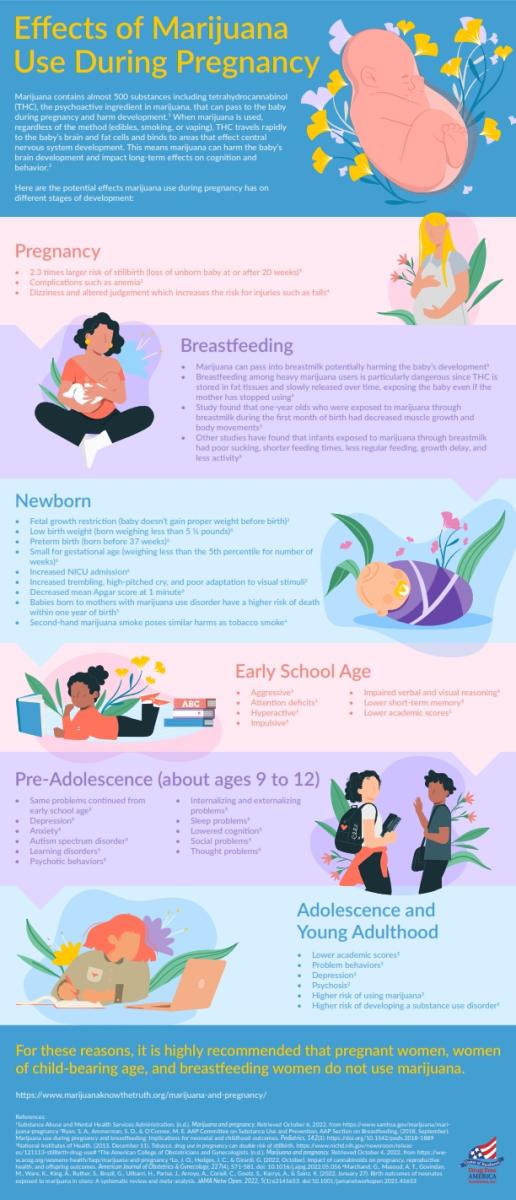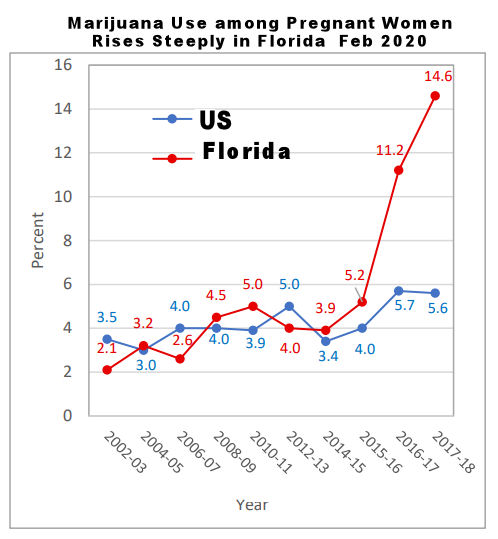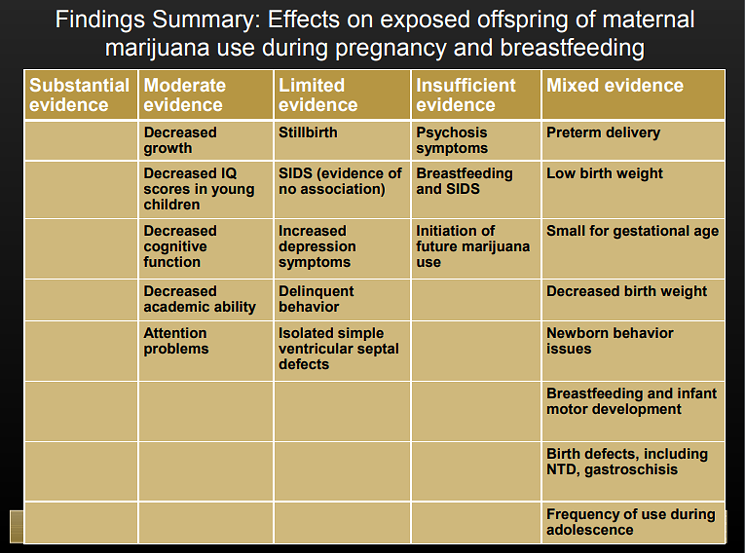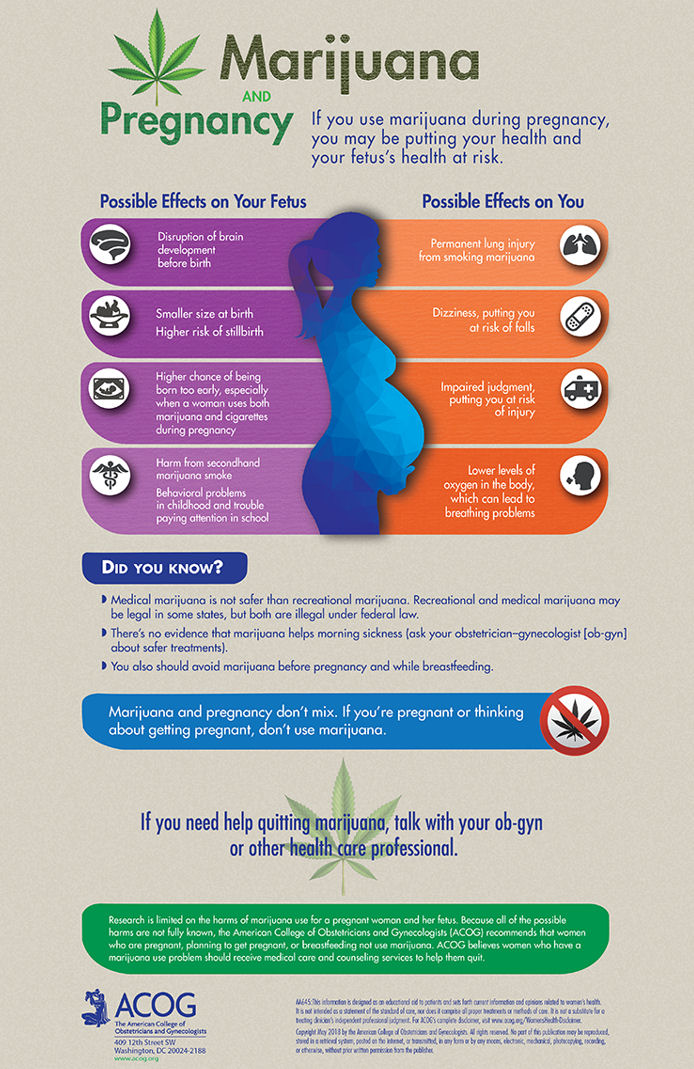Physical Effects
| Link | Article Date | Tags | Body |
|---|---|---|---|
| Adolescent brains exposed to THC are at higher risk of psychiatric disorders | 02/05/2024 | THC, Brain, Delta-8, Research |
THC exposure during adolescence may cause microglial cell death and brain changes, increasing schizophrenia risks in genetically susceptible individuals. |
| CDC- Marijuana and Pregnancy | 11/24/2023 | Pregnancy |
What are the potential health effects of using marijuana during my pregnancy? |
| DFAF- Marijuana and Pregnancy- Know the Truth | 11/24/2023 | Pregnancy, Breastfeeding |
Marijuana and the Risks to Pregnancy & Breastfeeding Marijuana contains almost 500 components including the psychoactive ingredient THC that can pass through the placenta to the baby during pregnancy, causing harm to the fetus.
|
| Recent Study Reveals the Harms of Legalization of Marijuana in Illinois And the US | 11/16/2023 | Pregnancy, car crashes, Children, pediatrics, Delta-8, Delta-8 Children | |
| Prenatal cannabinoid exposure: why expecting individuals should take a pregnancy pause from using cannabinoid products | 10/01/2023 | Pregnancy | |
| DFAF-Pregnancy and Marijuana | 03/17/2023 | Pregnancy, Drug Free America | |
| DFA-Marijuana and Pregnancy | 02/09/2023 | Pregnancy |
|
| SAMSHA- Marijuana and Pregnancy | 02/09/2023 | Pregnancy | |
| Underplaying the dangers of cannabis for women of childbearing age is sexist and pregnancy discrimination | 02/01/2023 | Pregnancy |
Cannabis can cross the placental and blood-brain barriers and is excreted in breast milk. The scope is wider than pregnancy alone as it accumulates and is active for many weeks. |
| What Does Vaping Do to Your Lungs? | 01/15/2023 | Vaping, John Hopkins, lungs |
Both smoking and vaping involve heating a substance and inhaling the resulting fumes. With traditional cigarettes, you inhale smoke from burning tobacco. With vaping, a device (typically a vape pen or a mod — an enhanced vape pen — that may look like a flash drive) heats up a liquid (called vape juice or e-liquid) until it turns into a vapor that you inhale. |
| Association of Mental Health Burden With Prenatal Cannabis Exposure From Childhood to Early Adolescence: Longitudinal Findings F | 12/01/2022 | prenatal, Pregnancy, mental health, study, Research, 2023 Presentation Dr Berry |
Conclusions and relevance: This study suggests that prenatal cannabis exposure and its correlated factors are associated with greater risk for psychopathology during middle childhood. Cannabis use during pregnancy should be discouraged. |
| Long-term effects of prenatal cannabis exposure: Pathways to adolescent and adult outcomes | 06/26/2022 | Pregnancy, adolescent |
Highlights |
| Cannabis legalization and cannabis-involved pregnancy hospitalizations in Colorado | 03/01/2022 | Pregnancy, science direct, Research |
Research has found that prenatal cannabis use may adversely affect fetal growth and neurodevelopment, be associated with future learning and behavioral problems in children, and increase risk of neonatal morbidity. (Cornelius et al., 2002; Day et al., 1994; El Marroun et al., 2011; Fried and Smith, 2001; Fried et al., 1999; Fried et al., 2003; Fried et al., 1997; Goldschmidt et al., 2000; Goldschmidt et al., 2008; Goldschmidt et al., 2012; Metz et al., 2017; Noland et al., 2005; Willford et al., 2010; Ryan et al., 2018; El Marroun et al., 2018) Several US organizations, including the American College of Obstetricians and Gynecologists and the American Academy of Pediatrics, recommend abstinence from cannabis use during pregnancy. (Ryan et al., 2018; Gynecologists, T.A.C.O.O.A, 2020) Despite these recommendations, there are concerns that the trend of cannabis use during pregnancy will continue to increase as more states and countries legalize cannabis and allow for commercial sales through dispensaries. (Mark and Terplan, 2017) |
| Underplaying the dangers of cannabis for women of childbearing age is sexist and pregnancy discrimination | 02/22/2022 | Pregnancy |
Cannabis can cross the placental and blood-brain barriers and is excreted in breast milk. The scope is wider than pregnancy alone as it accumulates and is active for many weeks. |
| Maternal Cannabis Use During Pregnancy and Maternal and Neonatal Outcomes: A Retrospective Cohort Study | 02/04/2022 | Pregnancy |
Results Conclusions |
| Marijuana Use among Pregnant Women Rises Steeply in Florida | 01/17/2022 | Pregnancy, FDCF, 2022 Marijuana |
Though research among pregnant women and marijuana-exposed neonates is limited, there is evidence to suggest that marijuana use may increase the risk of stillbirth and is associated with neurodevelopmental deficits in the infant. Evidence-based programs to prevent initiation of marijuana use should target women of childbearing age. In addition, THC passes from mother to baby through breastmilk; thus, cessation should continue post-partum.
|
| Prenatal Cannabinoid Exposure: Emerging Evidence of Physiological and Neuropsychiatric Abnormalities | 01/17/2021 | Pregnancy, 2022 Marijuana, frontiers in psychiatry |
In human studies, the preponderance of evidence suggests that prenatal cannabinoid exposure is predictive of several adverse neonatal outcomes, most notably FGR Fetal growth restriction and LBW low birth weight. |
| Marijuana and Breastfeeding | 10/13/2020 | Pregnancy, Breastfeeding |
Updated information and brochure |
| Maternal cannabis use in pregnancy and child neurodevelopmental outcomes | 08/10/2020 | Pregnancy |
Maternal cannabis use in pregnancy and child neurodevelopmental outcomes We link pregnancy and birth data to provincial health administrative databases to ascertain child neurodevelopmental outcomes. We use matching techniques to control for confounding and Cox proportional hazards regression models to examine associations between prenatal cannabis use and child neurodevelopment. Marijuana Use During Pregnancy Linked To Autism In Children: Study |
| Hillsborough County and beyond facts, Impact of Legalizing Marijuana in Flordia and throughout the Nation | 02/24/2020 | Colorado, suicide, addiction, Florida, Brain |
The real cost in legalizing marijuana can be counted by the lives impacted- addiction, vaping, dispensing, traffic deaths, suicides, overdoses, … |
| Cannabis use during pregnancy and its relationship with fetal developmental outcomes and psychiatric disorders. A systematic rev | 02/17/2020 | Pregnancy, PubMed, 2022 Marijuana |
Very scientific and medical article. |
| An Overview of Cannabis Use in Pregnancy | 01/16/2020 | Pregnancy |
Consumption of cannabis during pregnancy results in cannabinoid placental crossing and accumulation in the fetal brain, and other organs, where it interferes with neurodevelopment and the endocannabinoid system. Use during the postnatal period can also lead to secretion in breast milk for extended periods (up to a week) after last use. From retrospective studies, we know prenatal cannabis ingestion has been associated with anemia in the mothers as well as low birth weights, greater risk of preterm and stillbirths, as well as increased need for neonatal intensive care unit admissions. |
| What Do I Need to Know about Marijuana? | 09/25/2019 | Podcasts, Brain, driving, Effects |
What Do I Need to Know about Marijuana? Podcasts Answers all the myths with science and facts. Is it safe to drive using marijuana? If it is a medicine, how can it hurt me? What does marijuana use do to my brain? .... |
| Surgeon general: Marijuana during pregnancy and adolescence is dangerous | 08/07/2019 | Pregnancy |
“No amount of marijuana use during pregnancy or adolescence is safe,” said Surgeon General Jerome Adams at a press conference. |
| Self-reported Medical and Nonmedical Cannabis Use Among Pregnant Women in the United States | 07/09/2019 | Pregnancy, Volkow, PubMed |
Cannabis effects on fetal growth (eg, low birth weight and length) may be more pronounced in women who consume marijuana frequently, especially in the first and second trimesters.4 This study highlights the importance of screening and interventions for cannabis use among all pregnant women. |
| Largest brain study of 62,454 scans identifies drivers of brain aging | 05/01/2019 | study, Brain, aging, science daily |
The study found that a number of brain disorders and behaviors predicted accelerated aging, especially schizophrenia, which showed an average of 4 years of premature aging, cannabis abuse (2.8 years of accelerated aging), bipolar disorder (1.6 years accelerated aging), ADHD (1.4 years accelerated aging) and alcohol abuse (0.6 years accelerated aging). Interestingly, the researchers did not observe accelerated aging in depression and aging, which they hypothesize may be due to different types of brain patterns for these disorders. |
| Cannabis use during pregnancy: Are we at the verge of defining a "fetal cannabis spectrum disorder"? | 03/10/2019 | Pregnancy, PubMed |
Significant effects of prenatal cannabis exposure have been found on children's sleep, cognitive functions (memory and scholastic skills), as well as on executive (frontal lobe) functions (reasoning, attention, impulsivity, and motivation), and affective (depression) and anxiety symptoms throughout the stages of development. Following the presentation of two case vignettes, we integrate the published information on outcomes of maternal use of cannabis during pregnancy on the developing fetus and the "soft" neurological deficits and neuro-behavioral disturbances manifested by them from early childhood and evolving to peaks in adolescence. Taken together, these data serve to define what we call a heretofore unspecified "fetal cannabis spectrum disorder". |
| Is smoking pot while pregnant safe for the baby? | 02/14/2019 | NPR, Pregnancy |
Researchers say psychoactive compounds in marijuana easily cross the placenta, exposing the fetus to perhaps 10 percent of the THC — tetrahydrocannabinol — that the mother receives, and higher concentrations if the mom uses pot repeatedly. |
| How Marijuana Exposure Affects Developing Babies’ Brains, Infographic: How Exposure to Cannabis in Utero Affects Development | 01/16/2019 | Pregnancy |
Large-scale, longitudinal studies of humans whose mothers smoked marijuana once or more per week and experimental work on rodents exposed to cannabinoids in utero have yielded remarkably consistent intellectual and behavioral correlates of fetal exposure to this drug. Some exposed individuals exhibit deficits in memory, cognition, and measures of sociability. These aberrations appear during infancy and persist through adulthood and are tied to changes in the expression of multiple gene families, as well as more global measures of brain responsiveness and plasticity. Researchers currently consider these perturbations to be mediated by changes to the endocannabinoid system caused by the active compounds in cannabis. |
| Number of new heroin users drops dramatically, but meth, marijuana use up, survey says | 09/16/2018 | Pregnancy, heroin, McCance-Katz |
There was more alarming news. Use of illegal drugs, including cocaine, marijuana, and opioids by pregnant women increased significantly between 2015 and 2017. About 7 percent of pregnant women reported using marijuana. Three percent said they used it daily. McCance-Katz says marijuana use is linked to fetal growth problems, preterm births, stillbirths, hyperactivity and impaired cognition in newborns. |
| Marijuana Use During Pregnancy and Breastfeeding: Implications for Neonatal and Childhood Outcomes | 09/08/2018 | Pregnancy, Breastfeeding |
The importance of the published findings and the emerging research regarding the potential negative effects of marijuana on brain development are a cause for concern despite the limited research and are the basis for the following recommendations:
|
| Is CBD Oil Harmful or Healing? What No One is Telling You | 09/04/2018 | hash oil, cbd oil, Pregnancy |
CBD oil may potentially interact in a negative way with anti-epilepsy drugs. As of now, only in vitro (test tube) observations exist with no living organism testing proving safety. Drugs that may interact include:
|
| Marijuana and Pregnancy | 08/01/2018 | DFAF, Pregnancy, Infographics | |
| Opioid Use During Pregnancy | 07/16/2018 | opioid, Pregnancy, DFAF | |
| Marijuana and the Brain | 07/02/2018 | Brain, Drug Free America | |
| Majority of Dispensary Workers Told Undercover Callers Pregnant Women Could Use Pot | 05/09/2018 | Pregnancy, Colorado |
Researchers had two women conduct "mystery caller" phone conversations with employees at 400 dispensaries across the state, telling them that they were eight weeks pregnant and suffering from morning sickness. During the majority of those calls, the employees recommended the women use cannabis products. |
| Study shows prenatal cannabis use associated with low birth weights | 04/23/2018 | Pregnancy, study |
|
| Review of the public health risks of widespread cannabis use | 04/08/2018 | Pregnancy, car crashes, mental health, pediatrics, Long-term, Doctors, Research, second hand smoke, smoking |
1. Legalizing cannabis has been shown to increase the rates of motor vehicle accidents. |
| Smoking cannabis 'damages lungs' | 10/16/2017 | smoking, lungs, second hand smoke |
Even after less than six years of smoking the drug, the ill effects were already being seen on their breathing, according the research presented at the British Thoracic Society (BTS) winter meeting. |
| Committee Opinion No. 722: Marijuana Use During Pregnancy and Lactation | 10/02/2017 | Pregnancy, ACOG, 2022 Marijuana |
There are insufficient data to evaluate the effects of marijuana use on infants during lactation and breastfeeding, and in the absence of such data, marijuana use is discouraged. Notably, 34–60% of marijuana users continue use during pregnancy, with many women believing that it is relatively safe to use during pregnancy and less expensive than tobacco It is difficult to be certain about the specific effects of marijuana on pregnancy and the developing fetus, in part because those who use it often use other drugs as well, including tobacco, alcohol, or illicit drugs, and in part because of other potential confounding exposures. Marijuana smoke contains many of the same respiratory disease-causing and carcinogenic toxins as tobacco smoke, often in concentrations several times greater than in tobacco smoke. Studies of marijuana exposure during pregnancy are potentially subject to reporting and recall bias, often relying on self-reported habits, including frequency, timing, and amount of marijuana use. women using marijuana at least weekly during pregnancy were significantly more likely to give birth to a newborn less than 2,500 Several studies noted statistically significantly smaller birth lengths and head circumferences as well as lower birth weights among exposed offspring |





